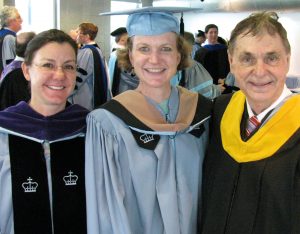Tuesday, May 21 was Class Day 2013 at Columbia University’s School of Continuing Education, a splendid event for everyone affiliated with the school and its programs, including its graduate degree programs. Program directors introduced more than 500 candidates for degrees, giving us a grand opportunity to watch them walk joyfully across the stage to be greeted by Dean Kristine Billmyer. And the mood of the day was described perfectly by one of my faculty colleagues in the academic procession, when he remarked, “On a day like this! Isn’t it great to be part of so much happiness?”
Well said.
Among the candidates were the first-ever graduates of Columbia University’s M.S. in Information and Knowledge Strategy (IKNS) program, created in 2011 to provide professional education within (and matched to) Columbia’s rigorous academic excellence in its many other programs.
Those of us affiliated with the program (including fellow faculty member Anne Kershaw and Academic Director Katrina Pugh, pictured with me below)  were feeling particularly celebratory because the graduation of the IKNS 2012 Cohort marked the introduction of a special group of knowledge workers into the management community. With the successful completion of their studies during the 16-month program (with three onsite residencies on the Columbia University campus), the IKNS graduates are now prepared to take on knowledge leadership roles in their companies and organizations. They’ve studied a wide array of carefully chosen subjects to prepare themselves as knowledge “thought leaders” for the companies where they’re employed (or for their new positions, for those graduates moving into different jobs now that they’ve completed their studies).
were feeling particularly celebratory because the graduation of the IKNS 2012 Cohort marked the introduction of a special group of knowledge workers into the management community. With the successful completion of their studies during the 16-month program (with three onsite residencies on the Columbia University campus), the IKNS graduates are now prepared to take on knowledge leadership roles in their companies and organizations. They’ve studied a wide array of carefully chosen subjects to prepare themselves as knowledge “thought leaders” for the companies where they’re employed (or for their new positions, for those graduates moving into different jobs now that they’ve completed their studies).
Graduation from the IKNS program requires proven expertise, and a simple listing of the required courses makes it clear that these graduates have mastered what they need to know to be knowledge strategists in the business and professional world:
- Information and Knowledge in the 21st Century Economy
- Management and Leadership in the Knowledge Domain
- Findability and Innovation with Information and Knowledge Assets: Fundamentals and Business Cases
- Enterprise-Wide Applications and Project Management
- Business Analytics and Strategic Intelligence
- Networks and Collaboration: Issues and Methods
- Information Policy and Regulatory Issues
These courses – plus electives in related subjects and the Master’s Capstone Project – ensure that Columbia’s IKNS graduates are prepared to take their place in the increasingly (and dramatically) demanding world of information and intellectual capital management. Employing companies and organizations have made it clear that they stand to benefit from the expertise these graduates acquired through the IKNS graduate program.
So it’s a good day for all of us involved in Columbia’s IKNS program. For some years now, those of us working in the knowledge domain had found ourselves referring to information and knowledge strategy as “the emerging management methodology.” No more. With these graduates – and IKNS graduates to follow – KM, knowledge services, and knowledge strategy are now embedded in the management arena. These graduates – one and all – are ready to put their knowledge and their expertise to work for their employing organizations, for their profession, and for the greater good. It is a very special time to be moving into this critical field of work.

Nerisa Kamar, President of the SLA Sub-Sahara Chapter, wrote on the chapter’s LinkedIn Group site:
Congratulations! Good work…
Guy responds:
Thanks, Nerisa. We’re very honored to be recognized by our Sub-Sahara Africa colleagues.
Guy keep up the good work: “You are not only talking the talk, you are walking the walk.”
The IKNS is a profound step in the direction, to finally moved practically and realistically out of the 20th century of industrialization, and into the 21st Century of ” The Post Capitalist Society, ” as defined by the Peter Drucker, (1993).
No longer can we sit idol as the global economies, sweep past us; and round circle around the USA. I have faith that these new “thought leaders,” will define knowledge paths well, and demonstrate excellence, in their KM applications.
As Founder and Disruptive Knowledge Innovation Officer at Knowledge Profits.com, the only thing I can honestly say; is congratulations finally; to ” Knowledge Made in America, and American Made Knowledge.”
Gregory D. Bailey
Founder/Chief Disruptive Knowledge Innovation Officer
KnowledgeProfits.com
Drucker, P. F. (1993). The Post Capitalist Society Harpers Collins Publishers. 10 East 53rd Street, New York, NY. 10022